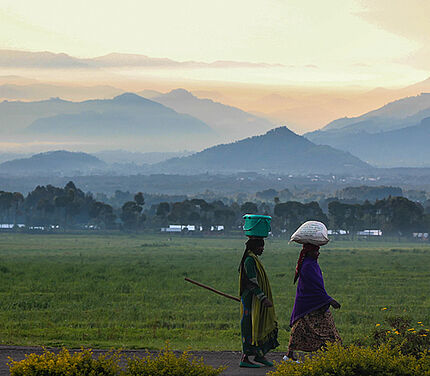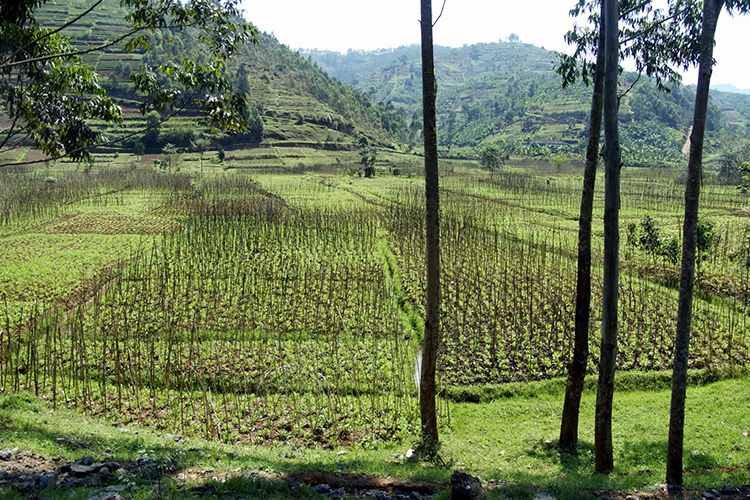AFRICA
Rwanda
Area: 26,338 km²
Geography: The high elevation of Rwanda and its location in the African Great Lakes region characterizes its geography. Savanna grassland is dominant, while also hills and mountains are stretching from west to east. The climate is mostly temperate and mild in the mountains. (CIA, 2019)
Land Degradation: Soil erosion and declining soil fertility are major concerns for agricultural development in Rwanda. High demographic pressure has increasingly led to the occupation of marginal areas and to the rapid and continuous soil degradation of the country’s fragile ecosystems. Land degradation contributes significantly to poor performance of the agricultural sector, a key pillar of the Rwandan economy. (ELD, 2018)
Sustainable Land Management: In recent years, sustainable land management has gained priority on the political agenda in Rwanda. The government development program “Vision 2020” set the goal to implement adequate land and water management techniques, coupled with a sound biodiversity policy. Moreover the voluntary targets for Land Degradation Neutrality are recognized as a support for the implementation and monitoring of the Rwanda Land Use and Development Master Plan and other related policies. (MINECOFIN, 2012) (ELD, 2018)

ELD ACTIVITIES
-
Case Study on Rio Conventions synergies (2024)
Title: Economics of Harmonizing Land Restoration Activities across the Rio Conventions in Rwanda and Implications for Food Security
Content: This study in Rwanda evaluates the potential for synergies from joint programming and implementation of land restoration activities under the Rio Conventions. Collaboration between the three Rio Conventions - the United Nations Convention to Combat Desertification (UNCCD), the Convention on Biological Diversity (CBD), and the United Nations Framework Convention on Climate Change (UNFCCC) - on land restoration is essential to achieve the goals of landdegradation neutrality, biodiversity conservation, mitigating and adapting to climate change, and more broadly, achieving the Sustainable Development Goals. The Total Economic Value framework approach is used for the valuation of ecosystem services and applies simulation modelling of transaction costs to identify synergies across land restoration activities. The study, thus, aims to provide policy-relevant evidence on opportunities for maximizing effectiveness, efficiency, and socio-economic impact from land restoration in Rwanda, with a particular emphasis on food security. -
Case Study on Natural Capital (2020)
Title: Achieving green growth through terrestrial natural capital restoration in Rwanda
ELD and the Green Growth Knowledge Partnership (GGKP), together with institutions and local experts, developed and applied new methods for achieving the SDGs through terrestrial natural capital restoration. -
Capacity building (2017-2020)
Within the Regreening Africa project, jointly implemented with the World Agroforestry Centre (ICRAF), the ELD Initiative is conducting trainings on the total economic valuation of terrestrial ecosystems and their services. Trainings are complemented by practical exercises as part of research within the country.
Capacity building report
Title: Insights from capacity building on the economics of land degradation in Rwanda
Authors: Lindsay C Stringer and Martin Dallimer
Report: ENThis report was carried out in the framework of the “Reversing Land Degradation in Africa by Scaling-up Evergreen Agriculture” project.
The underlying research is available from the institutions and authors of the studies. Information on the authors and institutions can be found in the report and the posters beneath. Please contact the ELD secretariat for more information.

CONTACT
ELD Secretariat
E-Mail: info@eld-initiative.org
